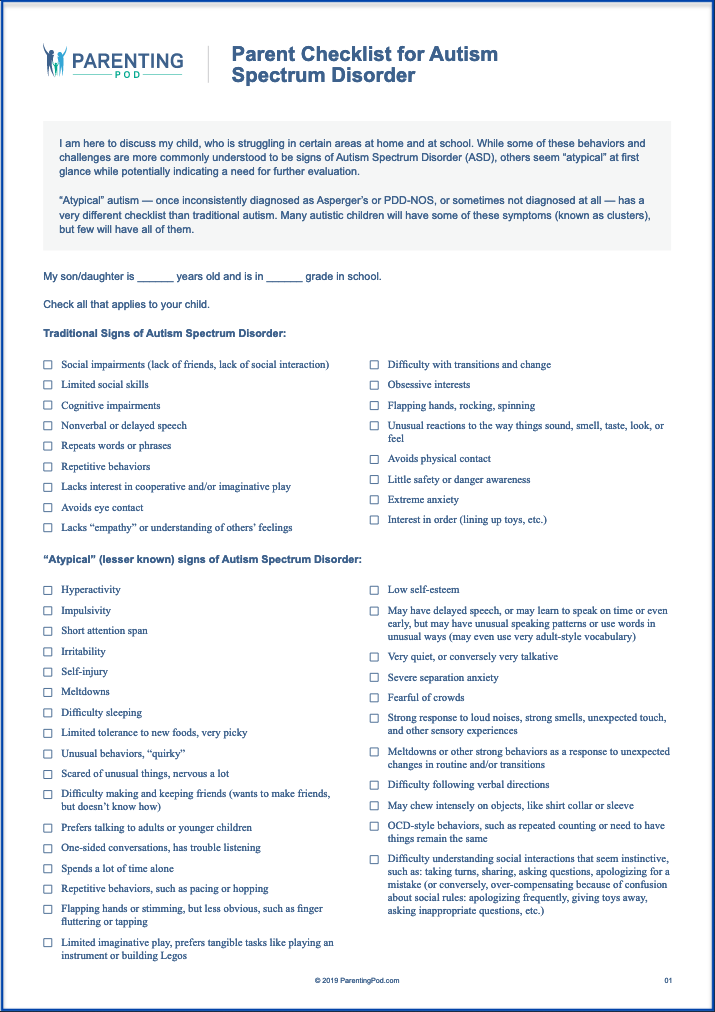How Autism Spectrum Therapies approach challenges in expression
How Autism Spectrum Therapies approach challenges in expression
Blog Article
Key Symptoms And Signs to Acknowledge in Individuals With Behavior Autism
When you experience someone with behavior autism, identifying crucial signs and signs and symptoms is essential. Additionally, sensory level of sensitivities can lead to overwhelming experiences.
Obstacles in Social Interactions
When you communicate with someone on the autism range, you might observe they fight with social cues and communication. These difficulties can make social interactions feel frustrating for them. You may see them avoiding eye contact or standing also close or too far away during discussions, which can develop misunderstandings. They might not notice body language or facial expressions, making it harder for them to determine just how others are really feeling.
When they do involve, they might talk about their rate of interests in wonderful detail without discovering if you're interested. Comprehending these difficulties can aid you approach interactions with compassion and perseverance, cultivating a more comfortable atmosphere for both of you.
Problem With Verbal and Non-Verbal Communication

Non-verbal interaction can be much more difficult. You might see a lack of eye get in touch with or limited use gestures, which can make communications feel awkward. Faces might not always align with the discussion, resulting in complication about their sensations. Acknowledging these indicators is necessary, as it helps you much better support and involve with individuals on the autism range. By understanding their interaction challenges, you can cultivate more significant links and provide an extra supportive atmosphere.
Recurring Actions and Regimens
Communication obstacles usually accompany other indicators of autism, such as recurring actions and a strong preference for routines. You might discover that individuals with autism typically take part in specific, repeated actions, like hand-flapping, rocking, or repeating expressions. These actions can provide convenience and a feeling of control in an often overwhelming globe.
Regimens are just as crucial; several people prosper when they adhere to a structured routine. You may find that changes to these regimens can bring about substantial distress. If they have a day-to-day ritual of eating breakfast at a particular time or following a particular course to institution, any kind of interruption can trigger anxiety.
Identifying these patterns assists you understand their habits and provide assistance. By suiting their need for regular and enabling repetitive activities, you can develop a more comfy atmosphere that eases their challenges.
Sensory Sensitivities

Usual Sensory Triggers
Sensory level of sensitivities can significantly affect everyday life for individuals with autism, as certain stimulations usually trigger overwhelming responses. Usual sensory triggers include loud noises, bright lights, and strong scents. Recognizing these triggers can aid you manage your setting much better.
Behavior Actions Described
Recognizing your behavior reactions to sensory sensitivities is essential, as they often reveal just how you engage with the world. You might see that particular noises, lights, or structures overwhelm you, bring about stress and anxiety or discomfort. When encountered with these stimulations, you might take out, cover your ears, or even react boldy. These actions aren't just traits; they're your method of coping with overstimulation. You may additionally find yourself seeking certain sensory experiences, like deep pressure or quiet environments, to help ground on your own. Recognizing these patterns aids you recognize your requirements better and can assist just how you interact them to others. By recognizing your sensory sensitivities, you can function towards creating a setting that feels extra convenient and comfortable for you.
Coping Strategies Introduction
Recognizing your sensory sensitivities is just the initial action; now it's time to check out coping approaches that can help you manage those experiences efficiently. Beginning by creating a sensory toolkit tailored to your needs. This might include noise-canceling headphones, fidget toys, or soothing fragrances. Developing an organized routine can also give predictability, reducing anxiety around sensory overload. Take breaks in a peaceful space to regroup when you feel overwhelmed. Practicing mindfulness techniques like deep breathing can help ground you in the moment. Furthermore, interact your requirements with those around you; having supportive friends and family can make a substantial difference. Keep in mind, discovering what works finest for you might take some time, so be open and patient to trying brand-new approaches.
Limited Interests and Focus
While numerous people establish a broad variety of rate of interests, those with autism frequently demonstrate limited interests and an intense concentrate on certain topics. You could observe that somebody with autism can spend hours diving into their favored click reference subject, whether it's a particular type of train, a specific flick, or a scientific principle. This intense emphasis isn't simply a hobby; it can come to be a main part of their identity and social communications.
You may locate that conversations rotate around these interests, and they might have a hard time to participate in broader subjects. For them, these focused interests give comfort and a feeling of proficiency. While it is essential to urge expedition of brand-new subjects, appreciating their interests is equally crucial. By comprehending and recognizing these limited interests, you can foster a supportive setting Check This Out where they really feel valued and recognized, permitting even more purposeful connections and interactions.
Emotional Law Difficulties
Individuals with autism frequently deal with difficulties in emotional regulation, which can be affected by their extreme focus on specific interests. You could see that when a person is deeply participated in a recommended task, they can experience strong emotions, whether exhilaration or stress. This intensity in some cases makes it hard for them to change gears or manage their sensations when points do not go as planned.

Variability in Developmental Turning Points
When it comes to developing milestones, you'll notice that individuals with autism typically show a broad range of variability. You might see a child excel in language find more info abilities yet battle with social interactions.
It's necessary to identify that each person's journey is distinct. Some may create complicated abilities early, only to face challenges later. Others could take longer to achieve standard turning points however then grow in details areas. Observing these patterns can help you understand their toughness and requires better.
Regularly Asked Inquiries
Exactly How Is Autism Diagnosed in Kid and Grownups?
To identify autism in children and grownups, experts evaluate actions, communication abilities, and social interactions. They frequently make use of standardized tests, meetings, and observations to establish if a private meets the requirements for autism range condition.
Are There Various Kinds Of Autism Spectrum Disorders?
Yes, there are various types of autism range disorders, including Asperger's disorder and prevalent developing disorder-not or else specified. Each kind differs in seriousness and features, so understanding these differences can help you far better assistance individuals with autism.
What Therapies Work for Individuals With Autism?
When considering efficient treatments for people with autism, you'll find choices like Applied Actions Analysis, speech therapy, and job-related treatment. Each method can assist improve communication, social abilities, and daily functioning tailored to private demands.
Can Individuals With Autism Lead Independent Lives?
Yes, individuals with autism can lead independent lives. With the best support, skills training, and resources, you can help them establish self-sufficiency, take care of day-to-day tasks, and thrive in various atmospheres, cultivating their independence.
How Can Families Support Loved Ones With Autism?
You can support your loved ones with autism by producing an organized atmosphere, motivating their passions, exercising perseverance, promoting communication, and promoting social skills. Celebrate their achievements, no issue exactly how small, and construct a helpful neighborhood.
Although numerous people on the autism spectrum can utilize and understand language, they commonly encounter substantial obstacles with both non-verbal and verbal communication. Recognizing these signs is important, as it helps you far better assistance and engage with individuals on the autism range. You may observe that individuals with autism frequently engage in details, repetitive actions, like hand-flapping, rocking, or duplicating expressions.Sensory level of sensitivities can significantly affect day-to-day life for individuals with autism, as certain stimulations commonly activate overwhelming reactions.When it comes to developmental turning points, you'll discover that people with autism usually show a large variety of variability.
Report this page